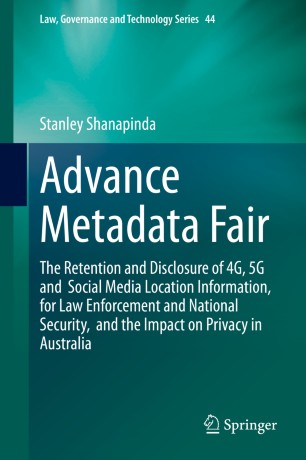

Most ebook files are in PDF format, so you can easily read them using various software such as Foxit Reader or directly on the Google Chrome browser.
Some ebook files are released by publishers in other formats such as .awz, .mobi, .epub, .fb2, etc. You may need to install specific software to read these formats on mobile/PC, such as Calibre.
Please read the tutorial at this link. https://ebooknice.com/page/post?id=faq
We offer FREE conversion to the popular formats you request; however, this may take some time. Therefore, right after payment, please email us, and we will try to provide the service as quickly as possible.
For some exceptional file formats or broken links (if any), please refrain from opening any disputes. Instead, email us first, and we will try to assist within a maximum of 6 hours.
EbookNice Team

Status:
Available4.6
33 reviewsThis book outlines the legal powers of a major Western nation – Australia – to collect and use location information. Mobile service and social media service providers now have the ability to track, record and store more precise location information. Unlike 4G, 5G mobile communications require that cell towers and antennas be in much closer proximity; as a result, the location data can reveal more personal and sensitive information about individual citizens. Despite this aspect, service providers are required to disclose the data to the authorities, without the need for a judicial warrant.
This book was written from the perspective of big location data software analytics, a capability that makes it possible to combine various location data points to create a profile on a given individual’s movements, habits, and political, religious and ideological orientation.
In this regard, privacy is poorly protected. The rationale used to justify the powers was enforcing serious crimes – terrorism offences. Location data can now be retained for at least two years and be collected to investigate even minor offences. This can be done without the person being reasonably suspected of a criminal offence – when the individual is simply determined to be a person of interest. This poses legal risks to vulnerable communities. And yet, such investigative techniques are deemed lawful and reasonable.
At a time when national security is so broadly defined to include economic issues, which in turn overlap with climate change and environmental protection, these legal powers should be reassessed.
The book clarifies the complex rules that every citizen must know in order to have agency. Further, it calls upon authorities to reflect and to self-regulate, by making the conscious decision to surrender some of their powers to review by the independent judiciary. Without the requirement for a judicial warrant or judicial review, the powers are unfairly broad.
The book pursues an interdisciplinary approach